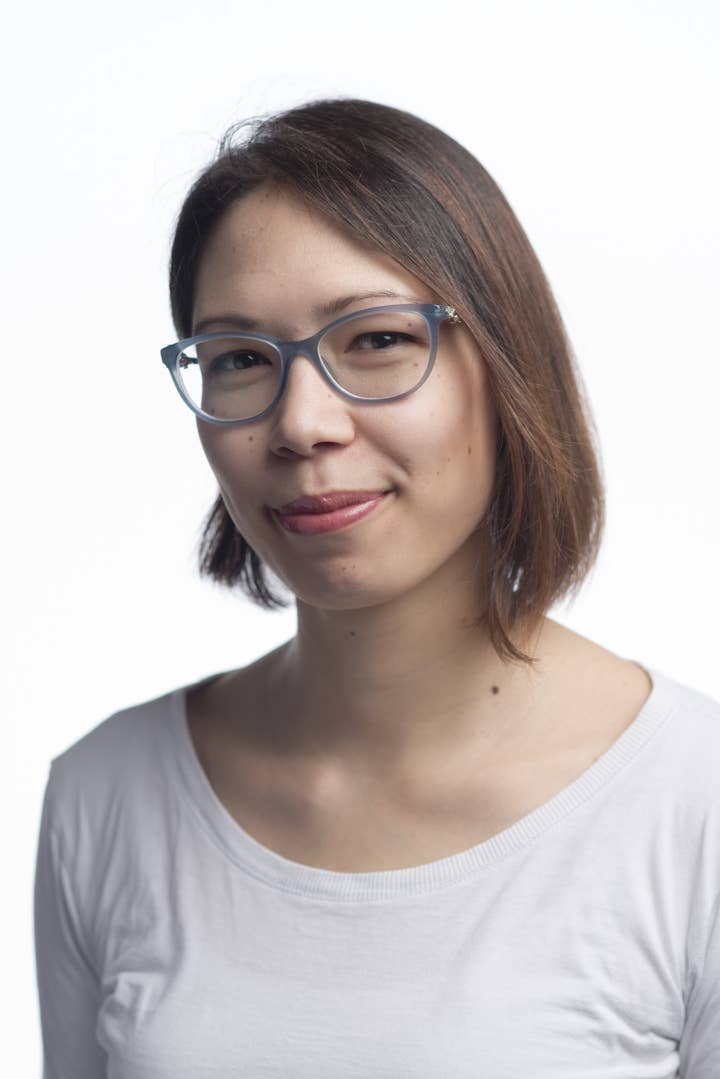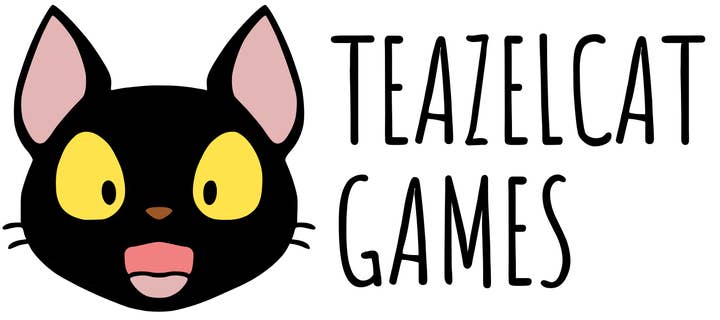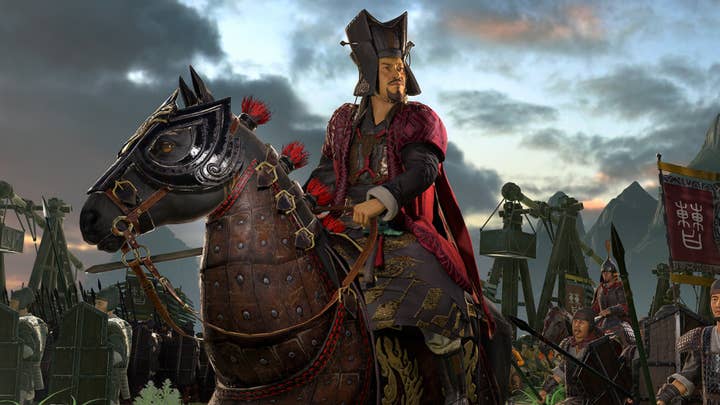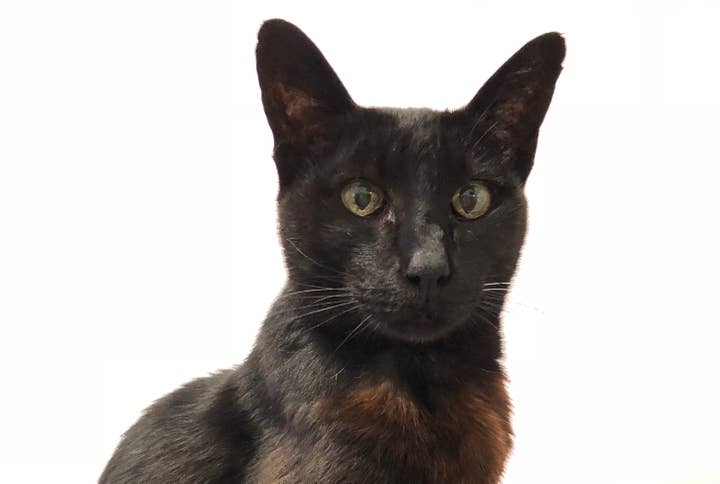Leaving AAA to make games for your mum in the name of your cat
Former Creative Assembly technical artist Jodie Azhar introduces her new studio Teazelcat Games
Starting your own studio is always a risk - particularly when you're leaving the stability of a major AAA employer.
Jodie Azhar, previously a technical artist at Creative Assembly, now faces that risk. Today, she's announcing her new studio - Teazelcat Games - and GamesIndustry.biz caught up with her last week to find out more.
Azhar actually left the Total War developer back in August and has since been learning the new skills and practices she needs to run a business. While heading up her own studio was never an early goal for her - "I was always quite happy to work on projects at studios and just be really good at my job," she tells us - a game idea kept niggling away until she was determined to make it.
Teazelcat will focus on making narrative games for PC and console - "because that's what I'm familiar with" - although Azhar admits there's "no reason I wouldn't go mobile at a later date". The focus on story-driven affairs will make a nice change of pace compared to what she was used to working on at Creative Assembly.

"I've spent the last decade working on games, the majority of which had combat as their main mechanic," Azhar says.
"They've all been good games, but they're not the kind of games I now necessarily play - same for a lot of other people. I want to make games for people who don't enjoy that fast reaction combat, and want something that's a bit more thoughtful with a bit more of an emotional impact.
"I've been saying, in quite a quaint way, that I want to work on a game that my mum will play."
Azhar reflects on a childhood playing puzzle adventures with her mum and older sister. The trio enjoyed classics like Day of the Tentacle, 7th Guest, 11th Hour, Myst and Riven. Yet as these have become fewer and far between, her mum has shifted towards Words With Friends, which can be less satisfying.
"The biggest issue for her is the accessibility," Azhar explains. "She's not going to go out and buy a console, but if I install something on the PC, she's quite happy to play adventure games because she's engaging with them in the same way she would with a good film or book."
In addition to giving the game a broader appeal, Azhar is also keen to ensure it "really makes use of what games are good at" - player agency and enabling users to feel like they're affecting the world.
"Right now where I am in my career, it feels like I can do a lot more and make a difference being a female CEO and running my own studio that is diverse and inclusive"
"But that does create difficulties for developers," she admits. "If you have a story you want to tell and you're giving players these multiple options, either you have to deal with having lots of different endings, or lots of different routes and choices you have to keep track of but you need to bring the player back onto the main storyline.
"Rather than trying to make all these choices that are very big and affect the whole world, I want to focus on having really engaging characters. In real life, if you have a friend that needs you to help them make a choice, their entire life isn't suddenly going to go off on a tangent just from making it - but the way they engage with you or with certain situations is affected. It makes it more personal, in a way.
"I also want everyone who plays the game to be able to get to the ending, but depending on what they've chosen to do in the game will determine their relationships with the characters or they'll discover little parts of the plot they might otherwise have missed. One of the big criticism of games is that if you're rubbish at it, you don't find out the ending."
Azhar hopes to bring her first game to market within two years - perhaps sooner, although she acknowledges that game development is "never shorter than what you plan for". She is currently working full-time on a prototype, as well as talking to peers about setting up a business, whether she needs a publisher and her funding options. Once she has a prototype, she can begin hiring a team around her.
"I want to get something working that I can then show to people, to give them an idea of what the project is, rather than trying to pitch to people like 'hey, do you want to come to work at this studio' with very little other information," Azhar explains.

"If I'm building up a studio and bringing other people on board, I want to be building the right culture. I think it will always remain a relatively small studio because I want to stay focused on the games themselves, rather than become a business person.
"The business stuff has been interesting to learn because it's all new and fresh, but it's not something that inspires me, it doesn't get me excited. So probably the first person I'd hire would be a business person to take over that side. It's good for me to know it, so I can have the conversations with someone, but I think I'm more valuable as a developer."
"I'm very much anti-crunch, and even in the ten years I've been working, I've done about 12 days of overtime. You can entirely make video games without these bad habits, it just takes planning"
For the first project, Azhar expects most of her team to be on contract in order to ensure the game is finished as soon as possible - and also to avoid having team members feeling like they're not contributing if the workload shifts away from their discipline. This also opens Azhar to a whole world of talent as she plans to work remotely, although for future projects she hopes to secure proper premises.
"I don't want to give anyone a job that isn't permanent, or where I'd have to let them go in six months," she says. "I'm very much anti-crunch, and even in the ten years I've been working, I've done about 12 days of overtime. You can entirely make video games without these bad habits, it just takes planning."
She adds: "Mind you, if during the first project I find someone who would be a really good fit, I'd love to bring them on permanently."
Azhar is also keen to draw on her experiences working on building diversity, inclusion and company culture at Creative Assembly, giving more people opportunities to realise their own visions.
"The first project is based on my idea," she admits. "It's a game I've wanted to make given the opportunity, but past that I'll be looking at bringing people on that have all these different ideas, have these different backgrounds and stories they can't necessarily tell within existing studios."
She added: "[Creative Assembly's] a big studio now, it's about 500 people, and when you're that big, it's very slow to change the direction of the ship. I really respect what the top level directors - Tim [Heaton, studio director] and Gareth [Edmonson, COO] - are doing, as well as their head of comms Lucy Boxall, because they are very much focused on not just making a good culture but making a culture that's right for them. You can't please 500 people, but you can definitely choose what you want to focus on in terms of quality and being a really good studio for the industry.
"For me, it's still the best big studio, but I think right now where I am in my career, it feels like I can do a lot more and make a difference being a female CEO and running my own studio that is diverse and inclusive, building from the ground up on the values I care about."
"Until you put something in people's hands, you're not really tested as to whether your game is fun"
The emphasis on getting the first game out within two years stems from lessons she's learned watching other indies succeed and fail over the years. Lengthy development on debut titles appears to be a pattern she does not want to fall into.
"You see a lot of post-mortems where indies are saying, 'oh, well, it took us six years', or they got to six years and they couldn't finish it," Azhar says. "I want to get this finished as soon as possible, so I can show the kind of games my studio will make, and that gives people an expectation of the sort of games we'll do and whether that's the sort of game for them."
Naturally, her experience in AAA development helps as she has a greater understanding of the production cycle. But equally it can be argued this puts her at a disadvantage - after all, she's shifting from a specialisation as a technical artist to meeting the workload demands of a generalist - plus running a business. But it's developing directly for consumers, rather than for her colleagues, that's the biggest difference for Azhar.
"Whereas before I knew who my clients were, I was making tools for artists - now I'm making games for the public, and that could be anyone," she says. "It's a little bit more ambiguous. I can say what games I enjoy, and I can look at what's popular and what people are engaging with. But until you put something in people's hands, you're not really tested as to whether your game is fun.
"The big challenge so far is being a designer. I've done the tech side, I've done the art side, there's a lot that I know in those areas and stuff that I don't know, but it's more measurable in a way. Whether I'm a good designer... the proof will come when people see what it is we're making."

Her transition is evocative of a recent GamesIndustry.biz article by The Fall director John Warner, who suggested we should stop encouraging aspiring developers from 'going indie' until they've gained AAA experience. It's a sentiment that, to an extent, Azhar agrees with.
"It's very dangerous to say, especially to students and graduates, 'oh, if you can't find a job or you've got a great idea, you can become independent'," she says. "In the first year at a studio, you learn so much more about development than when you're studying - even if you have experts teaching you, there's so much difference to you being hands on in an environment where you have to ship products.
"You learn so much from the process of making a game by yourself, but if you burn through all your finances on your first project, you can't put those lessons to use"
"There is a sort of hopeful naivety to the indie scene: we see the success stories but only the smallest fraction of the ones that fail... You don't just become an overnight success. You believe in what you make but you have to be realistic."
She adds that there is, of course, a wide spectrum of studios between indie and AAA - including from AA or B-tier games to mobile and kids studios - so it's not an either/or situation.
Another lesson she has learned from the rise and fall of other indies is the importance of planning ahead. While she's confident in her first project's potential, Azhar is constantly preparing for what happens if it doesn't sell and ensuring she has enough money for a second title.
"You learn so much from the process of making a game by yourself, but if you burn through all your finances on your first project, you can't put those lessons to use because you need to go and get another job, you can't start another project," she says.
"At the end of the first project, either it's a success and we make money, or we've learned enough that we can put into practice on the second game and increase our chances of being a success."
Finally, we do have to ask about the name. Indies have brought many a quirky company moniker to the industry, seemingly cobbling together random fun-sounding words. The origins of Teazelcat are actually found much closer to home.
"She's my cat," Azhar laughs. "She's a little old lady, she's got three legs so she's really been through the wars. I did have her when she had four legs, but then she got in an accident. She's 18 years old, and she's got high blood pressure so she's taking several sets of pills. I just wanted to find a name that was personal and that was quite nice.
"Plus the games industry has this fascination with cats, so... yeah."

